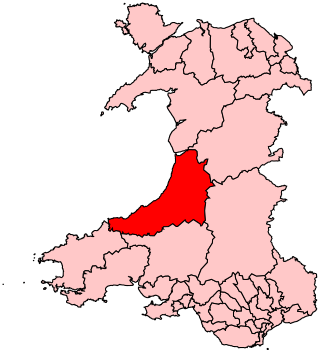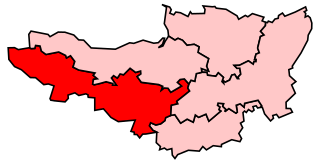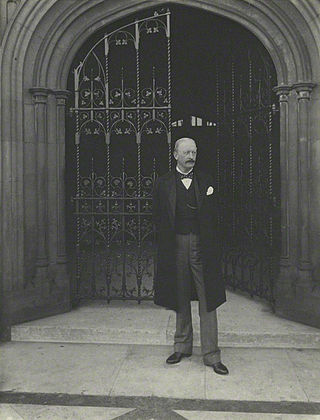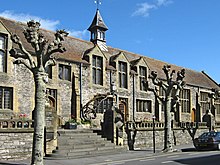
The Liberal Party was one of the two major political parties in the United Kingdom, along with the Conservative Party, in the 19th and early 20th centuries. Beginning as an alliance of Whigs, free trade–supporting Peelites, and reformist Radicals in the 1850s, by the end of the 19th century, it had formed four governments under William Ewart Gladstone. Despite being divided over the issue of Irish Home Rule, the party returned to government in 1905 and won a landslide victory in the 1906 general election. Under prime ministers Henry Campbell-Bannerman (1905–1908) and H. H. Asquith (1908–1916), the Liberal Party passed reforms that created a basic welfare state. Although Asquith was the party leader, its dominant figure was David Lloyd George.
The Liberal Unionist Party was a British political party that was formed in 1886 by a faction that broke away from the Liberal Party. Led by Lord Hartington and Joseph Chamberlain, the party established a political alliance with the Conservative Party in opposition to Irish Home Rule. The two parties formed the ten-year-long coalition Unionist Government 1895–1905 but kept separate political funds and their own party organisations until a complete merger between the Liberal Unionist and the Conservative parties was agreed to in May 1912.

Baron Hindlip, of Hindlip in the County of Worcester and of Alsop-en-le-Dale in the County of Derby, is a title in the Peerage of the United Kingdom. It was created in 1886 for the businessman and Conservative politician Sir Henry Allsopp, 1st Baronet. He was head of the brewing firm of Samuel Allsopp & Sons of Burton upon Trent, and he also represented East Worcestershire in Parliament.

Bridgwater is a parliamentary constituency represented in the House of Commons of the Parliament of the United Kingdom since 2024 by Ashley Fox of the Conservative Party. It elects one Member of Parliament (MP) by the first past the post system of election.

Ceredigion was a parliamentary constituency represented in the House of Commons of the UK Parliament. Created in 1536, the franchise expanded in the late 19th century and on the enfranchisement of women. Its boundaries remained virtually unchanged until 1983. From 1536 until 1885 the area had two seats : a county constituency (Cardiganshire) comprising the rural areas, the other the borough constituency known as the Cardigan District of Boroughs comprising a few separate towns; in 1885 the latter was abolished, its towns and electors incorporated into the former, reduced to one MP. The towns which comprised the Boroughs varied slightly over this long period, but primarily consisted of Cardigan, Aberystwyth, Lampeter and Adpar, the latter now a suburb of Newcastle Emlyn across the Teifi, in Carmarthenshire.

Taunton was a constituency represented in the House of Commons of the Parliament of the United Kingdom and its predecessors from 1295 to 2010, taking its name from the town of Taunton in Somerset. Until 1918, it was a parliamentary borough, electing two Member of Parliaments (MPs) between 1295 and 1885 and one from 1885 to 1918; the name was then transferred to a county constituency, electing one MP.

Bath is a constituency in the House of Commons of the Parliament of the United Kingdom represented since 2017 by Wera Hobhouse of the Liberal Democrats.

Burnley is a constituency centred on the town of Burnley in Lancashire which has been represented since 2024 by Oliver Ryan, of the Labour Party.

Devizes was a constituency in Wiltshire, England, which included four towns and many villages in the middle and east of the county. The seat was held by members of the Conservative Party continuously for a century from 1924.

Alexander Asher was a Scottish politician and lawyer, who was elected as Member of Parliament for the Elgin Burghs constituency from 1881 until his death in 1905. He was also Solicitor General for Scotland on three occasions, and was Dean of the Faculty of Advocates.

Lieutenant-Colonel Edward Thomas Ruscombe Wickham was a Conservative Party politician who served as the Member of Parliament (MP) for Taunton from 1935 until 1945. He had previously served in India from 1910 until 1935, first as an officer in the British Indian Army, and later a member of the Indian Political Department. From 1919 to 1921, he acted as officer in attendance for the European tour of the Shah of Persia, who awarded him the Order of the Lion and the Sun, 3rd Class. He fulfilled the same duties in 1928 for the King of Afghanistan. During his time as an MP, he served as a Parliamentary Private Secretary to two Secretaries of State for War, led a delegation to Australia and New Zealand in 1944, and visited a concentration camp soon after the Second World War.
Henry Allsopp, 1st Baron Hindlip DL, known as Sir Henry Allsopp, Bt, between 1880 and 1886, was a British businessman and Conservative politician.

Samuel Charles Allsopp, 2nd Baron Hindlip, was a British businessman and Conservative politician who sat in the House of Commons between 1873 and 1887 when he inherited the peerage.
The 1902 Bury by-election was a by-election held in England on 10 May 1902 for the House of Commons constituency of Bury in Lancashire.

Alfred Percy Allsopp was an English businessman and Conservative Party politician.
The 1885 Antrim by-election was a by-election held on Thursday 21 May 1885 for the British House of Commons constituency of Antrim in present-day Northern Ireland.

The 2015 United Kingdom general election was held on Thursday, 7 May 2015 to elect 650 members of Parliament (MPs) to the House of Commons. The Conservative Party, led by Prime Minister David Cameron, won an unexpected majority victory of ten seats; they had been leading a coalition government with the Liberal Democrats. It was the last general election to be held before the UK voted to leave the European Union (EU) in June 2016.

Lieutenant-Colonel Sir Alfred Cholmeley Earle Welby was a Conservative Party politician who served as the Member of Parliament (MP) for Taunton from 1895 until 1906. He had previously served in the British Army, rising to the rank of lieutenant-colonel in 1892. He stood unsuccessfully for the Conservatives in 1885, 1886 and 1892 prior to gaining his seat in Taunton. In 1906 he opted not to stand again in Taunton, but to contest the seat in East Finsbury, but was defeated. He was a London County Councillor from 1907 to 1910, and during the First World War, he was secretary of the Royal Patriotic Fund Corporation.
The 1888 Dundee by-election was a parliamentary by-election held on 16 February 1888 to elect one of the two Members of Parliament (MPs) for the British House of Commons constituency of Dundee.
The 1887 St George's, Hanover Square by-election was held on 9 February 1887 following the resignation of the incumbent Conservative MP, Lord Algernon Percy. Percy vacated his Parliamentary seat by being appointed Steward of the Manor of Northstead on 31 January 1887.














